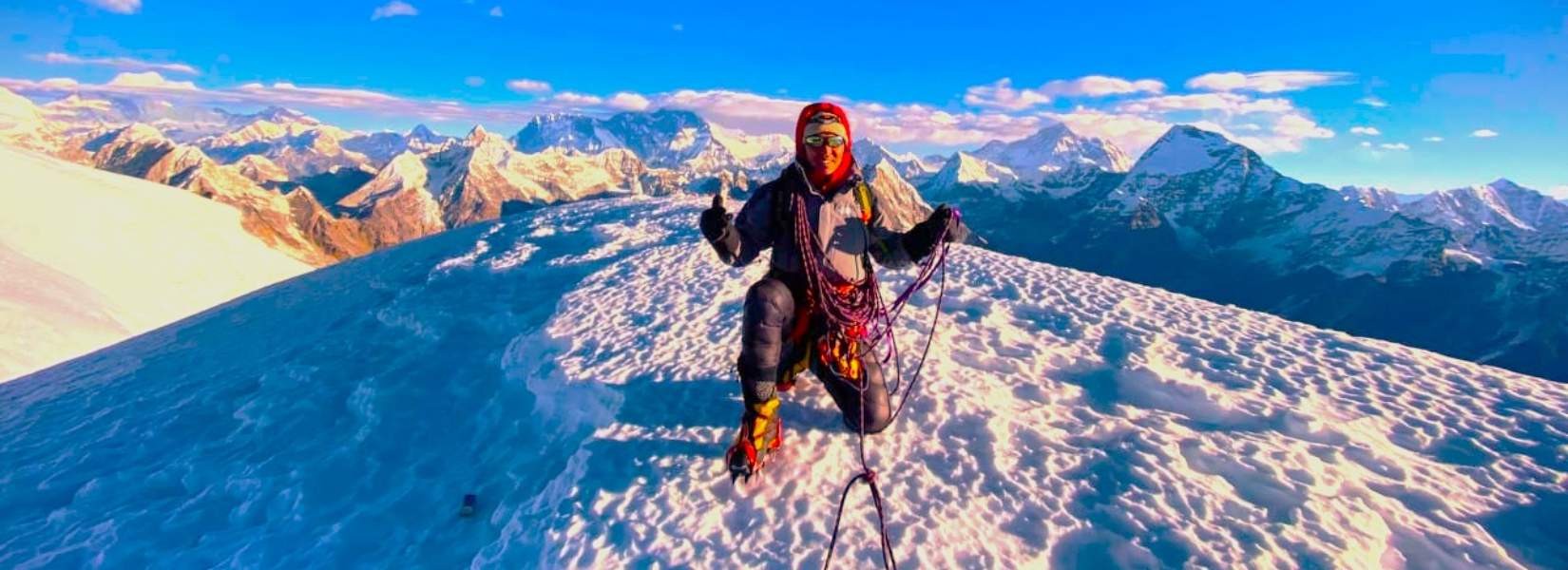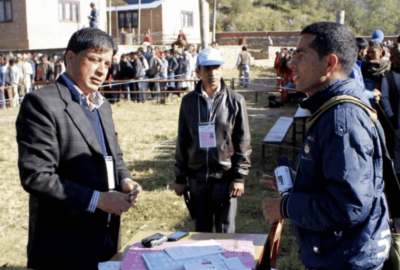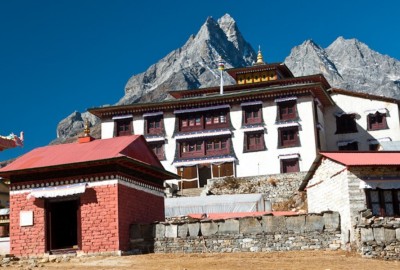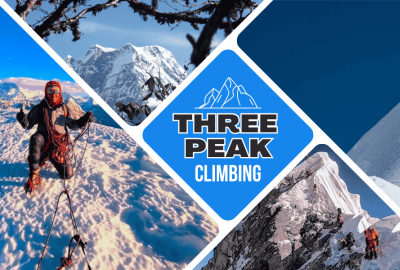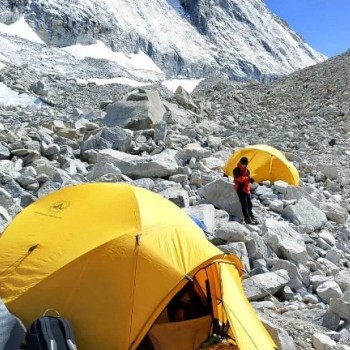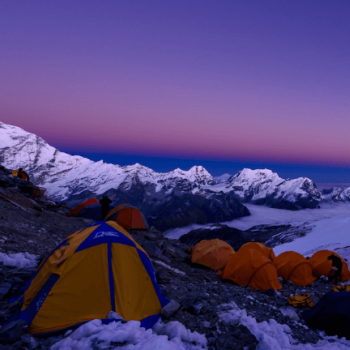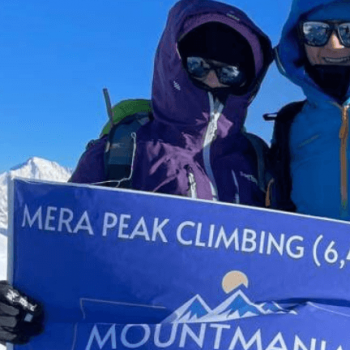Experience the thrill of summiting Nepal’s highest trekking peak with our 2-day Mera Peak Climbing Package from Khare. This base camp service includes professional Sherpa guides, essential climbing gear, high-altitude camping, and panoramic views of Everest, Lhotse, Makalu, Cho Oyu, and Kangchenjunga. Perfect for fit adventurers and beginner climbers!
Table of Contents
Plan your trip to Nepal
Customize your trip with help from a local travel specialist.
Mera Peak Climbing is Nepal’s most accessible and popular non-technical peak climbing adventure for beginner and experienced climbers alike. Standing tall at 6,467 meters, Mera Peak holds the title of the highest trekking peak in Nepal, located in the Everest region. While the full expedition typically takes over two weeks, many adventurers now opt for a Short Mera Peak Climbing Package from Khare, which covers the 2-day summit itinerary including Base Camp services, essential gear, experienced Sherpa guides, and meals.
If you’ve already trekked to Khare (5,000m), this compact, professionally organized package is perfect to climb Mera Peak in 2 days, with one night at High Camp and a summit push starting before dawn. Enjoy an unforgettable Himalayan experience with stunning 360° views of five of the world’s tallest peaks over 8000m—Everest, Lhotse, Makalu, Cho Oyu, and Kangchenjunga—all in a single panoramic sweep.
Why Choose Mera Peak Climbing from Khare?
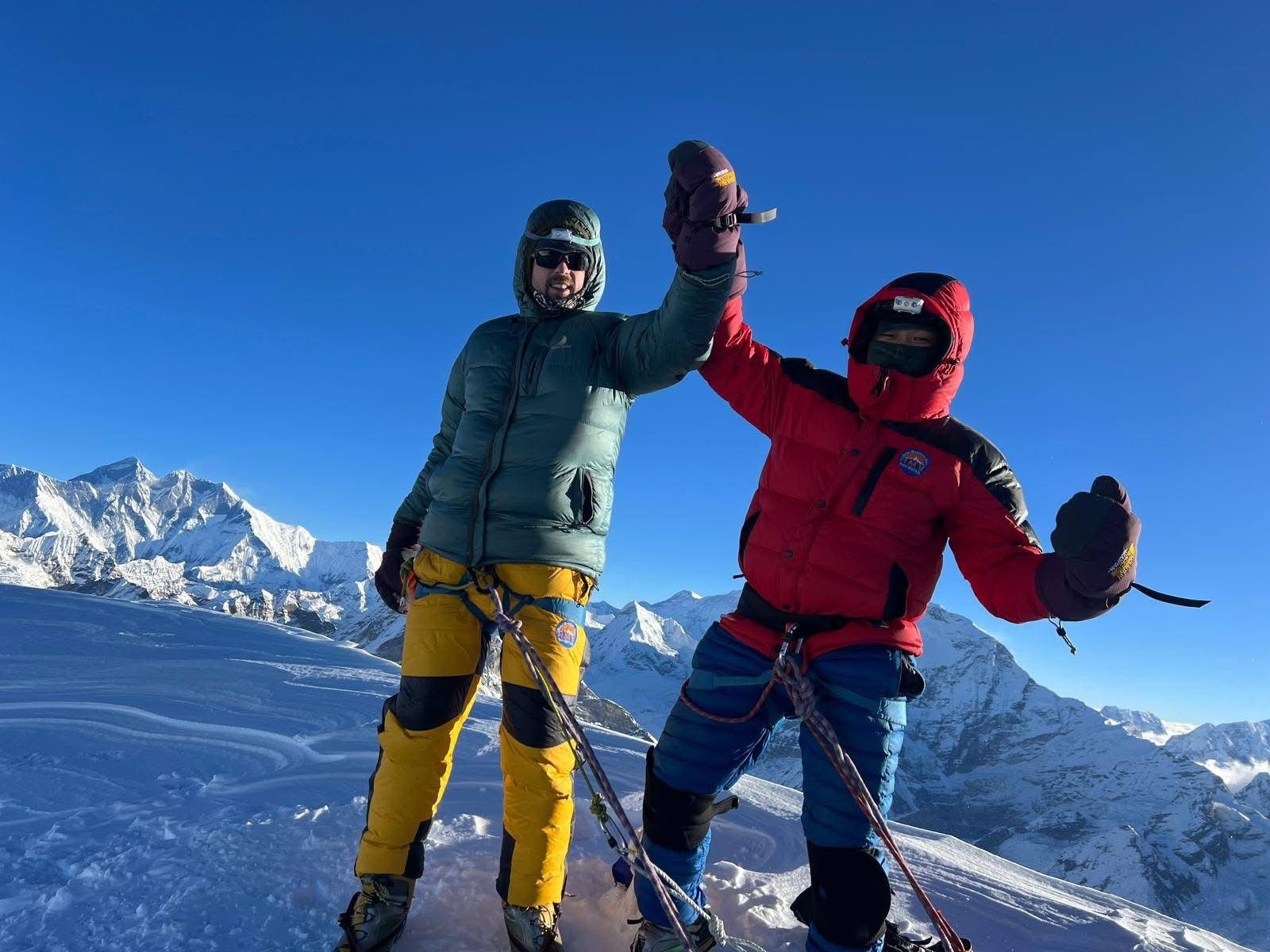
This short Mera Peak itinerary offers the ultimate high-altitude challenge without the long approach trek, designed for acclimatized trekkers and climbers already based in Khare. Here’s why it’s one of the best short expeditions in the Himalayas:
Highlights: Mera Peak Climbing from Khare
- Climb the highest trekking peak in Nepal at 6,467 meters
- Start and end your adventure in Khare (5,000m) – ideal for acclimatized trekkers
- Trek to Mera High Camp (5,800m) through stunning glaciers and Himalayan moraines
- Witness unrivaled sunrise views of Everest, Makalu, Lhotse, Cho Oyu & Kangchenjunga
- Summit and return to Khare in just 2 days
- Base Camp Service Package includes climbing gear, high camp logistics, food, guide, and tents
- Ideal for training before 8000m expeditions like Amadablam or Everest
Short Mera Peak Itinerary from Khare (2 Days)
This short, focused itinerary is ideal for trekkers already in the Khare region and ready to take on the Mera Peak summit challenge. Here's what your journey will look like:
Day 1: Khare (5,000m) to Mera High Camp (5,800m)
- Duration: 5 to 6 hours
- Terrain: Glacier, snow-covered moraines
- Accommodation: Tent (North Face Dome)
- Meals: Lunch, Dinner (prepared by staff)
- Pre-climb briefing and gear check in Khare
- Trek across the glacier to High Camp
- Camp setup, acclimatization rest, early dinner
Day 2: Summit Day (6,467m) and Return to Khare
- Start: Around 2 AM
- Duration: 8–9 hours round trip
- Terrain: Snow slopes, fixed rope sections (mild gradient)
- Meals: Hot beverages, snacks during climb, lunch/dinner at Khare
- Early morning summit push with headlamps
- Spectacular sunrise from the summit
- Panoramic views of Everest, Lhotse, Cho Oyu, Makalu, Kangchenjunga
- Return carefully to Khare by early afternoon
Mera Peak Base Camp Services – What’s Included?
Our Base Camp Service package is designed for trekkers looking for a fully supported Mera Peak climb from Khare. Here's what's covered in the package:
High Camp Setup
- North Face Dome Tent (2 pax sharing)
- Kitchen & dining tents
- Hot meals prepared by cook team
- Warm beverages: tea, coffee, soup
- Snacks: chocolate, cookies
Climbing Equipment (Provided)
- Climbing boots
- Crampons
- Ice axe
- Helmet
- Harness
- Carabiners (karabiners)
- Fixed rope and safety gear
- Ice screws, snow bars, rock pitons
- Main rope and belay devices
- Jumars and figure-8 devices
Emergency Gear
- Satellite phone communication
- First-aid kit
- Oxygen cylinder (on request)
- Heli rescue coordination available (charges extra)
Personal Gear – Not Included
Please bring the following personal items:
- -20°C sleeping bag
- Down jacket & windproof pants
- High-altitude gloves & mittens
- Headlamp
- Backpack (35–50L)
- Sunglasses and sunscreen
Fitness & Training for Mera Peak
Although Mera Peak is considered non-technical, climbers must be physically fit, mentally prepared, and well-acclimatized. Training in advance is essential.
Recommended Pre-Climb Training:
- Cardio: Running, cycling, swimming (3–4x/week)
- Hiking practice: With backpack at altitude
- Strength: Focus on legs (lunges, squats), core stability
- Stair climbing or hill sprints
- Practice walks with mountaineering boots and crampons (if possible)
Health Preparation
- Maintain proper hydration at altitude
- Monitor for AMS (Acute Mountain Sickness)
- Consult with a physician before undertaking high-altitude climbs
Difficulty Level of Mera Peak Climbing
The Short Mera Peak Climb from Khare is rated as moderate to challenging, mainly due to the altitude and weather conditions. While the route involves no vertical rock or ice climbing, you will trek across snowfields, icy paths, and glacier crossings.
Key Challenges:
- Cold temperatures (can drop below -20°C)
- Thin air and low oxygen levels above 5,500m
- Early summit push (2–3 AM start)
- Use of basic mountaineering equipment required
That said, Mera Peak is achievable for fit beginners with guidance from professional Sherpas and proper acclimatization.
Mera Peak Climbing Package Cost from Khare (2026–2027)
The price of the 2-day Mera Peak Base Camp Climbing package varies based on the number of climbers in your group:
Group Size | Cost Per Person (USD) |
Solo Climber | $700 |
Group of 2–5 | $650 |
Group of 6–10 | $600 |
What’s Included in the Cost:
- All climbing gear (except personal)
- One-night High Camp accommodation
- Meals and snacks at High Camp
- Sherpa climbing guide
- Summit support & guidance
- Climbing permits (Mera Peak & Local)
- Pre-climb training session at Khare
What’s Not Included:
- Personal clothing and sleeping bag
- Trek to/from Khare (this package starts from Khare)
- Travel insurance
- Tips for staff (optional but appreciated)
- Emergency evacuation costs (if needed)
How to Join Mera Peak Climbing from Khare?
You can join the Mera Peak Base Camp Climb with us after trekking to Khare via Lukla, Paiya, Kothe, and Thangnak. Once in Khare, our team will provide a full briefing and conduct a training session to ensure you're fully prepared for the summit.
How to Get to Khare?
- Fly from Kathmandu to Lukla
- Trek via: Paiya → Panggom → Ramailo Danda → Kothe → Thangnak → Khare
- Recommended time to reach Khare: 6–7 days
What to Expect from Summit Point?
Climbing to the top of Mera Peak rewards you with one of the best mountain panoramas in the world. From the summit, you can witness:
- Mount Everest (8,848.86m) – World's highest
- Lhotse (8,516m) – 4th highest
- Makalu (8,485m) – 5th highest
- Cho Oyu (8,188m) – 6th highest
- Kangchenjunga (8,586m) – 3rd highest
- Dozens of other peaks above 6,000m & 7,000m
Best Time to Climb Mera Peak
The best months for Mera Peak climbing are:
- Pre-Monsoon (Spring): April to early June
- Post-Monsoon (Autumn): Late September to November
These periods offer:
- Clear skies & better visibility
- Stable weather conditions
- Ideal temperatures for climbing
Note: Avoid monsoon (July–Aug) and deep winter (Dec–Feb) unless you're an experienced mountaineer with winter gear.
Why Choose Us for Mera Peak Climbing?
- Local Sherpa experts with decades of Himalayan experience
- Carefully curated Base Camp Service – great for budget and flexibility
- Fixed departures or private options available
- 100% safety-focused with attention to acclimatization and weather
- Climber-friendly gear rental options
FAQs for Mera Peak Climbing – Base Camp Service
1. Where does the Mera Peak Base Camp Service start from?
The Base Camp Service typically starts from Khare (4,950m), which is the last village before Mera Peak High Camp.
2. What is included in the Base Camp Service?
Usually, it includes:
- Experienced climbing guide
- Porters
- Meals and accommodation during the climb
- Tented camping at High Camp
- Climbing gear (optional or rental)
- Mera Peak climbing permit
- National Park and local entry permits
3. How difficult is Mera Peak climbing?
Mera Peak is considered a non-technical trekking peak, but it is physically demanding due to high altitude and long summit day (10–12 hours).
4. Do I need prior mountaineering experience?
Not mandatory. Basic knowledge of using crampons, ice axe, harness, and ropes is helpful. A pre-climb training session at Khare or High Camp is usually provided.
5. What is the altitude of Mera Peak summit?
The summit of Mera Peak is 6,476 meters (21,247 ft) above sea level, making it the highest trekking peak in Nepal.
6. How long is the climb from Khare to the summit?
Typically:
- Day 1: Khare to Mera High Camp (5,800m)
- Day 2: Summit push (midnight start) and return to Khare
7. How many days are needed from Khare to summit and back?
3 days are ideal:
- Khare to High Camp
- Summit Mera Peak and descend to Khare
- Contingency/rest day (weather buffer)
8. Is altitude sickness a risk on Mera Peak?
Yes. Proper acclimatization is essential. AMS (Acute Mountain Sickness) can affect climbers above 3,000m. Staying at Khare for 1–2 nights before climbing is recommended.
9. Is oxygen available in case of emergency?
Most Base Camp services provide supplemental oxygen and oximeter, along with a satellite phone or radio communication. Always confirm with your service provider.
10. Do I need a climbing permit?
Yes, you need:
- Mera Peak climbing permit from NMA (Nepal Mountaineering Association)
- Makalu Barun National Park permit
- Local permit (Khumbu Pasang Lhamu Rural Municipality)
11. What type of accommodation is provided?
- Lodge/Teahouse in Khare
- Tented camp at High Camp
Sleeping bags and insulated mattresses are often included.
12. Are meals provided during the climb?
Yes. Three meals a day are provided, including breakfast, lunch, and dinner. High-calorie meals and warm drinks are given during the summit push.
13. Can I rent climbing gear at Khare?
Yes. You can rent:
- Mountaineering boots
- Crampons
- Harness
- Helmet
- Ice axe
- Down jacket, etc.
However, availability can be limited in peak season.
14. What should I carry for the climb?
Essentials include:
- Warm layered clothing
- Gloves, hat, and sunglasses
- Water bottles/thermos
- Energy snacks
- Sunscreen and headlamp
- Personal medications
15. How fit should I be for Mera Peak?
You should be in good physical condition. Cardiovascular endurance and strong legs are essential. Prior trekking experience at high altitude is highly recommended.
16. Can the summit be attempted in bad weather?
No. Safety is a priority. The summit push will be delayed or canceled if the weather is poor (high winds, snowstorms, whiteouts).
17. What is the success rate for Mera Peak?
The success rate is above 80% when proper acclimatization, fitness, and weather conditions align, especially with professional guide support.
18. What is the best time to climb Mera Peak?
The best seasons are:
- Spring (April to mid-June)
- Autumn (late September to November)
Monsoon and winter are not recommended.
19. Is travel insurance required?
Yes. Insurance that covers high-altitude trekking and emergency helicopter evacuation is mandatory.
20. Can I join a group for Mera Peak Base Camp Service?
Yes. Some providers offer group departures from Khare with shared guide and support. This reduces cost compared to private service.
21. How much does Mera Peak Base Camp Service cost?
It ranges from USD 500–800 per person, depending on group size, inclusions (gear, oxygen, contingency), and service provider.
22. Is tipping the guide and porters expected?
Yes. Tipping is customary in Nepal. Average tipping per person:
- Guide: $40–50
- Porter: $20–30
Conclusion
Whether you’re an aspiring climber or a seasoned trekker looking to summit your first Himalayan peak, our Short Mera Peak Climbing Package from Khare offers the perfect balance of challenge, support, and experience.
Contact us to reserve your spot for the 2025 or 2026 climbing season.

